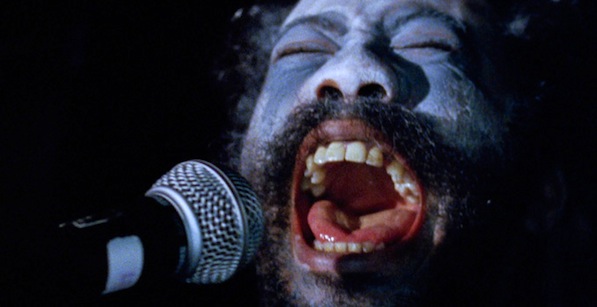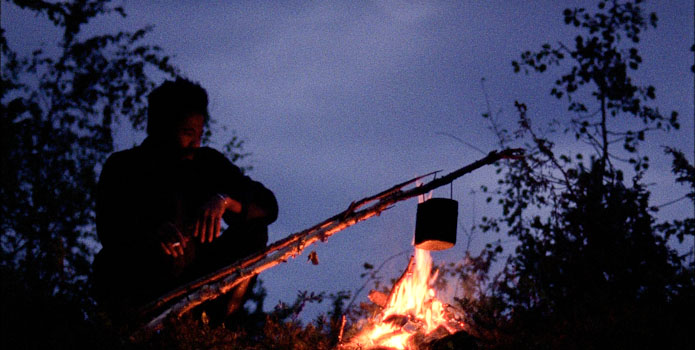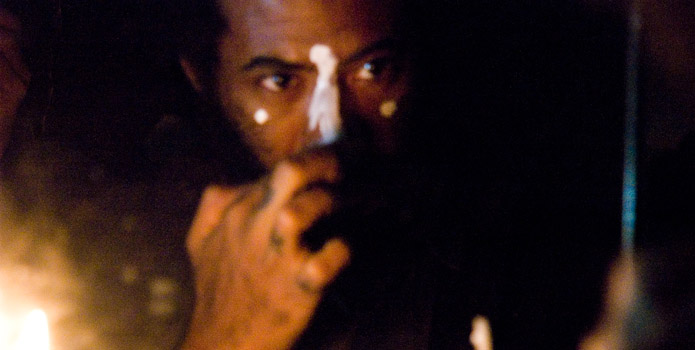Ben Rivers and Ben Russell create what we might call a liminal cinema. Although the makers of A Spell to Ward Off the Darkness (screening TIFF) have been most closely aligned with the avant-garde film world, they stake out a position somewhere between trance film, portraiture, and ethnography. Their films, then, identify and problematize certain dual aspects of realism that could be said to “haunt” both experimental film and anthropological documentary. So much avant-garde film is about closing the gap within representation, allowing cinema’s physical substrate to assert itself (e.g., grain, looping, end flares, highly visible edits). Or in some cases, it’s about minimizing temporal anteriority, making film refer to a “now” instead of a “then.” By contrast, much ethnographic cinema is concerned with catching its subjects at moments of supra-individual, transcendent subjectivity (trance states, religious ecstasy, heightened ritual). In short, materialist cinema and ethnographic modernism share a common desire, to reach out beyond semiology and achieve the ineluctable real.
In Russell’s films, he has consistently explored ritual and transcendence in various forms, particularly in his Trypps films. In comparing, for example, the audience at a hardcore show being overwhelmed by waves of sound (Black and White Trypps Number Three, 2007) with a performance of a “native ritual” for tourists in Suriname (Trypps No. 6. (Malobi), 2009) or even just going to the desert to drop acid (Trypps No. 7 (Badlands), 2010), Russell examines both the fundamental impenetrability of other people’s psyches, and the fact that “the varieties of religious experience” are comprehensible to others only as a set of signs. (Even in a shared experience, like the rock show, it’s doubtful that everyone is having the same “trip.”) At the same time, Russell’s films are engaging with a kind of visceral movement, a phenomenological chiasmus between bodies and forms, that is absolutely irreducible to language.
Rivers’ cinema operates at a kind of acute angle to these concerns. Many of his films could be described as anthropological portraits, examinations of the way that various people have chosen to live apart from the imperatives of late capitalist consumption and wage labor. Whereas Russell’s figures are often involved in inward journeys, Rivers’ subjects are more fully engaged with the outside world, even as they scratch out an existence on the margins of its broader concept of society. In his most recent feature film, Two Years at Sea (2011), Rivers provides us with a look at Jake Williams, a scrapper and jack-of-all-trades who lives in relative solitude, his cabin brimming with mechanical and electric doodads. We see Williams work through the four seasons to keep fed, stay warm, and make ends meet. Rivers’ closeness with Williams is evident, even though the men exchange only two words throughout the film. Just like Russell, Rivers is concerned with the codes and mores of ethnographic film, and how to swap the customary presumption of knowledge endemic to ethnography with a more poetic, collaborative attempt to offer provisional truths.
Their methods complement each other well in A Spell to Ward Off the Darkness, even though at times it’s possible to see one filmmaker’s approach asserting itself a bit more prominently, and then the reverse being true in another moments. This is really only the case because of the thorough complementarity of the styles; the minor points of diversion been amplified in context. This is a film built in three parts, all of them connected by someone we might call a protagonist (Robert AA Lowe), whose situation across the film could be said to exemplify a series of limit-experiences. The man is exploring liminality, finding ways to be on the margins, both in community and alone.
The first part is the roughest, and can prove the sturdiest impediment for the casual viewer. Lowe and fourteen other individuals are living on an island commune off the coast of Estonia. The editing and camerawork are jittery and disheveled, although by the end of the segment, they do settle down a bit. But “the Bens” are not playing at some kind of Dogme 95 approach. Rather, form follows function in the commune sequence; the makers have chosen to depict the joys and impatience of collective living through organized pandemonium. Just as, in a memorable scene from this sequence, one man describes an orgy, wherein bodily boundaries become seriously blurred, the first part of A Spell is chaotic, inelegant, and once you imbibe its rhythms, quite fun.
Lowe virtually fades to the background in section one. By contrast, section two finds him all alone (presumably by choice) in the Finnish woods, sleeping rough, and wandering. Much like Jake in Two Years at Sea, or figures in other Rivers films such as Origin of the Species (2008), Lowe can be seen at close range, his personality developing in the film on the basis of his direct, tactile engagement with the world around him. The journey concludes in Norway, in front of an audience as the vocalist for a Black Metal band. While this final sequence resonates with Russell’s Trypps 3, this is fundamentally different. The early short was a painterly study of audience response. (The band, Rhode Island’s Lightning Bolt, were heard but never seen.) By contrast, Rivers’ and Russell’s camera stalks the stage, examining the performers’ faces and movements in order to consider their transformation—what sort of “spell” might be coming over them.
In many respects this is the most accomplished film that either artist has produced. This is not to say that it is the best. I do not that think that is the case; both of them have made other work that is richer and more resonant. However, A Spell reflects both filmmakers’ fascination with the normalization of what others might call the extremity of experience. By observing Lowe in multiple scenarios across time, rather than in an isolated look at a particular stage of his existence. Rivers and Russell make one of their points as clearly as possible. People are mutable events, and there is only one spell to ward off the fear of becoming another. That is to embrace the chance to evolve into what one is not.







